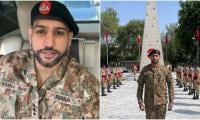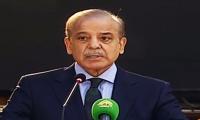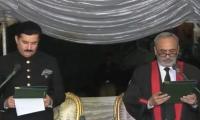PESHAWAR: Pakistani Taliban Monday announced that two of its splinter groups — Jammat-ul-Ahrar and Hezb-ul-Ahrar — had rejoined the mainstream Taliban.
The banned Tehrik-i-Taliban Pakistan (TTP), in a statement, said the decision was made in a meeting of the militant leaders, held recently. TTP spokesman Mohammad Khurasani said that JuA leader Maulvi Omar Khalid Khurasani and HuA leader Mukkarram Khurasani aka Omar Khurasani pleaded allegiance to the TTP chief Mufti Noor Wali Mehsud aka Abu Asim Mansoor. Taliban sources said the first thing that Noor Wali Mehsud had started after becoming the TTP chief was to talk to different militant leaders of splinter groups and bring them back to the mainstream outfit.
“Mufti Noor Wali met everyone and listened to their grievances. He succeeded in resolving their complaints and bringing them back to the TTP,” said one militant leader. Pleading anonymity, he said it would strengthen the TTP that wasweakened by the Pakistani military as a result of massive offensives, launched against it in the tribal districts along the Afghan border.
The TTP spokesman said leaders of the two splinter groups formally announced an end to their separate groups and merged them in the TTP. He said the TTP militants welcomed leaders of the two splinter groups with firing shots into the air when they arrived at the meeting place along with their fighters. The TTP released photos of the ceremony in which dozens of armed militants could be seen sitting on ground in an open area and pledging allegiance to Mufti Noor Wali Mehsud.
The TTP spokesman didn’t mention when and where the meeting took place, but Taliban sources said the militants had gathered in the border area between Pakistan and Afghanistan. Noor Wali Mehsud had replaced Maulana Fazlullah Khurasani when he was killed in a drone attack in Afghanistan on June 14, 2018.
Noor Wali belongs to South Waziristan tribal district. When the Mehsud militants of the TTP divided into two major factions, one led by Hakimullah Mehsud and another by Maulana Waliur Rahman, in South Waziristan, the militants had then resorted to infighting.
A dreaded militant commander, Khalid Mehsud aka Khan Said Sajna, had replaced Maulana Waliur Rahman group when he died in a US drone strike in North Waziristan. He fought Sheheryar Mehsud, who had replaced Hakimullah Mehsud after his death in the US drone attack in North Waziristan. Both, Khan Said Sajna and Sheharyar Mehsud had inflicted heavy losses on each other by killing their fellow fighters and militant commanders of rival groups.
Mufti Noor Wali belonged to Khan Said Sajna group in the TTP. Sajna was latter killed in US drone attack in Afghanistan along with his bodyguards and thus Mufti Noor Wali Mehsud was nominated chief of his faction.
The TTP had suffered huge losses during the Zarb-e-Azb military operation launched against all militant groups in North Waziristan on June 15, 2014. Most of the TTP commanders and fighters had either gone underground or fled to neighbouring Afghanistan. They, however, started regrouping in North Waziristan and South Waziristan and parts of other tribal districts along the Afghan border. The TTP-affiliated militants claimed a number of terrorist activities in North Waziristan.
They recently carried out a suicide attack on security forces in South Waziristan, which was stated to be the first suicide attack after a long time in the militancy-stricken tribal district. South Waziristan is the birthplace of the TTP and after its founding leader Baitullah Mehsud and his successor Hakimullah Mahsud, the Mahsud militants again brought the leadership of the TTP to their home. The JuA, which had departed from the TTP in 2014, had owned a number of deadly attacks in Pakistan including the 2016 suicide bombing in a park in Lahore that the group said it carried out to target Christians celebrating Easter. It killed more than 70 people.
Efforts were under way for many months for merger of TTP and JuA/ HuA. Representatives from both sides met at different locations in Afghanistan. However, on Aug 13, the talks were stalled, but due to efforts of Afghan intelligence agency National Directorate of Security (NDS) and Indian intelligence agency Research and Analysis Wing (RAW), both parties were brought together and talks resumed on August 16.
Oath of allegiance took place in Paktia/ Kunar Afghanistan. Following decisions were taken after the merger:
a. Mufti Noor Wali will be the Ameer of TTP and all activities inside Pakistan will be carried out.
b. Ikram alias Turabi, ex-JuA head, has been appointed as head of Amari Shura. He was in Peshawar central jail, and after getting bail from court this year rejoined the JuA.
c. All physical and suicide attacks will be carried out after approval from Markazi and Rahbari Shura.
d. Pakistan Army, Police and Rangers will be primary targets.
However, stalemate is still found on the following points.
Reservations of the JuA
a. Income from nephrite and marble mines will not be shared because it is property of people of Mohmand TD.
b. Commander Ezatullah ex-JuA member, is in custody of Nizami Shura, ex-TTA, over murder charges, and it should be forced to release him.
c. JuA/ HuA will continue to carry out acts in Mohmand TD with the consent of TTP.
Maulvi Rafiuddin alias Abu Hamza, in a voice message, told source that he should propagate that meeting took place in Pakistan and not to mention Afghanistan, as it would be an evidence against the group. Rafiuddin is based in Logar. He also coordinates meetings of TTP leadership with Afghanistan law-enforcement agencies (LEAs) in Kabul.
When stability is returning to Afghanistan with the help of Pakistan, an effort is being made to sabotage it. Propagating that this meeting took place in Pakistan is to malign the country, which had cleared most of its soil from the presence of terrorists.
A UN report, released recently, indicated the presence of a large number of TTP Taliban in Afghanistan and their continuous operations against Pakistani forces and civilians.
||
hief Minister Ali Amin Gandapur on Friday de-notified his special assistant on science and technology and information...
Dr. Muhammad Fakhare Alam Irfan, a BS-22 officer of Pakistan Administrative Service , awaiting posting, has been...
Data of Chinese nationals in Islamabad has been initially compiled to take special security measures, along with the...
SC will take up next week important cases, including the appeal of the Sunni Ittehad Council against the decision of...
President Zardari approved issuance of retirement notification of Justice Shaukat Aziz Siddiqui on attaining the age...
President Asif Ali Zardari speaks during an interview in this still on January 29, 2024. — Facebook/Pakistan Peoples...







